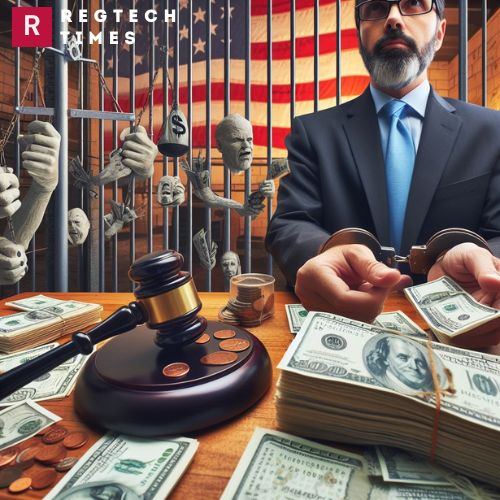In a court verdict yesterday, a Florida attorney was sentenced to eight years in prison. This decision derives from his involvement in a conspiracy to defraud the United States and escape taxes, which was tied to his promotion of an illegal Charitable Contribution Tax Fraud. This operation revolved around the provision of bogus charitable deductions, which was a serious violation of legal and ethical guidelines.
According to court documents and statements presented during proceedings, Michael L. Meyer, a resident of Davie, Florida, used his legal and accounting expertise from at least 2013 to 2021 to orchestrate a complex scheme of Charitable Contribution Tax Fraud under the guise of his so-called “ultimate tax plan.” Meyer, along with Rao Garuda and Cullen Fischel, pitched this misleading plan to wealthy individuals as a way to reduce their tax burdens by taking advantage of fake charitable deductions.
What is Charitable Contribution Tax?
“Charitable Contribution Tax” typically refers to tax deductions that individuals or organizations can claim for donations made to qualifying charitable organizations. These deductions can reduce taxable income, thereby potentially lowering the amount of tax owed. However, in cases of fraud or misuse, such as in the scenario described earlier, “Charitable Contribution Tax Fraud” involves exploiting these deductions illegally for personal gain by falsifying donations or engaging in other deceptive practices.
Deciphering the Modus Operandi: Florida Attorney’s Charitable Contribution Tax Fraud Scheme Unveiled
Meyer’s method under the Charitable Contribution Tax Fraud Scheme involves creating boilerplate transactional documentation for his clients while falsely displaying considerable transfers of assets to charities under his control. Contrary to the appearances generated by these documents, clients maintained complete control and utility over the ostensibly donated assets. Meyer deceived his clients by claiming they could legally access these assets for personal use via purportedly tax-free loans and then execute a complex “exit strategy” to repurchase their donations at a greatly reduced cost.
Furthermore, Meyer engaged in unethical procedures such as backdating papers to allow clients to claim phony donations on past years’ tax returns, aggravating the scheme’s fraudulent nature. This systematic effort to use charitable contribution deductions for personal benefit highlights Meyer’s heinous behavior.
Despite many warnings from various sources, including the Internal Revenue Service (IRS), Michael L. Meyer continued to operate his Charitable Contribution Tax Fraud scheme, known as the Ultimate Tax Plan. Even after several IRS audits found the plan to be an economic charade, Meyer reportedly recognized the findings and agreed to close the bogus organizations linked with the scheme. Meyer, however, did not stop his illegal activities; instead, he founded new “charities” and continued to sell his illegal tax shelter to wealthy taxpayers.
In April 2018, the Department of Justice filed a civil lawsuit against Meyer in an attempt to cease his advertising of the Ultimate Tax Plan on Charitable Contribution Tax. As part of this legal action, the Justice Department served civil subpoenas on Meyer’s clients, requesting documents relevant to the fraudulent operation. Meyer responded by producing fraudulent, backdated documents and instructing his clients to submit them to the Justice Department. Meyer also produced fake, backdated documents in response to document requests received directly from the Justice Department.
In April 2019, a federal district judge ordered a permanent injunction against Meyer, barring him from organizing, promoting, marketing, and selling the Ultimate Tax Plan. Despite the legal interventions and limits imposed on him, Meyer’s continued evasion of regulatory scrutiny and manipulation of the legal system demonstrates the extent of his dishonest efforts to perpetuate his fraudulent plan.
Consequences of Deception: Justice Served in High-Stakes Tax Fraud Case
Meyer’s ill-gotten proceeds from the sale of the Ultimate Tax Plan exceeded $10 million, which he openly spent on extravagant items such as a large multi-million-dollar mansion and a magnificent fleet of luxury vehicles. Among his gaudy collection were prominent automobiles such as Lamborghinis, Rolls-Royces, Mercedes-Benzes, a Bentley, and a Ferrari, which demonstrated his opulent lifestyle fuelled by fraudulent activities.
In addition to Meyer’s lengthy prison sentence, U.S. District Judge Moore for the Southern District of Georgia ordered three years of supervised release. The court has postponed the determination of restitution until a later date, considering the gravity of Meyer’s offenses and the need for complete accountability.
Meanwhile, Meyer’s accomplices, Rao Garuda and Cullen Fishel, pleaded guilty in the Northern District of Ohio to conspiracy to defraud the United States. Their sentencing date is set for April 16, marking another chapter in the legal ramifications of this intricate plot.
Acting Deputy Assistant Attorney General Stuart M. Goldberg of the Justice Department’s Tax Division announced these developments, emphasizing the department’s commitment to prosecute those who abuse the tax system for personal benefit. Thanks were given to U.S. Attorney Markenzy Lapointe for the Southern District of Florida and his colleagues for their significant support in the case.
The IRS Criminal Investigation led the investigation into this complicated web of dishonesty, illustrating law enforcement agencies’ coordinated efforts to prevent financial fraud and protect the tax system’s integrity.
Assistant Chief Michael Boteler and Trial Attorneys Andrew Ascencio and Michael Jones of the Tax Division are prosecuting this case with rigor and precision, demonstrating legal professionals’ commitment to holding financial crime perpetrators accountable for their conduct.


